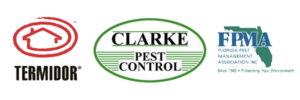Termite control
HOW CAN I PROTECT MY HOME FROM TERMITES
There are several ways homeowners can protect their home, one of your biggest investments. As pest control professionals, we recommend at the least to have an annual inspection. The cost is minimal and the inspection should include a thorough inspection to the interior and exterior of the home including the garage, porches & patios and the attic space.
The inspection is important because it may detect problems sooner so that intervention can be done before the damage occurs. Clarke Pest Control can also point out vulnerable areas and ways to correct those areas to help prevent the termites from coming in. We thoroughly inspect your home to discover and eliminate sources of moisture. Wood that has been affected by moisture can be attractive to termites, so locating these sources early on are another crucial step in being proactive against the infestation of termites.
5 MOST VULNERABLE PLACES IN MY HOME FOR TERMITE INFESTATION
- Any wood in contact with the soil such as wood supports through concrete slabs or siding touching the soil.
- Cracks in the concrete slab.
- Open voids in concrete block foundation.
- Around plumbing pipes, tub traps, and expansion joists in the slab.
- Wall construction transitions from concrete block to wood frame such as bay windows.
If you are building a new home, the construction type is important. The structure can be built with mechanical barriers in place. A pre-construction soil treatment is applied under and around the perimeter of the slab during the building of the home. If you have an older home or a more susceptible construction type, some homeowners opt to treat their homes before the home has any evidence of subterranean termite infestation, as a preventative measure.
WHAT TO DO IF YOU FIND TERMITES IN YOUR HOME !!
First, don’t panic! We’ve seen literature from some pest control companies that lead you to believe that your roof will cave in tomorrow (after the discovery that your home has subterranean termites) but that isn’t true. Scare tactics is not the way to get business but homeowners do need to educate themselves.
Homeowners should consult a reputable, experienced, certified pest control operator rather than attempt home remedies to control this serious pest. Treatment will be needed and repairs may need to be completed depending on the extent of damage done to the home. Our company uses the product Termidor. Clarke Pest Control is a certified-trained Termidor Partner. Termidor is a non repellent or “undetectable” chemical treatment. Termites cannot see, smell, taste or avoid Termidor. Instead they contact, ingest and share it with their colony. Termidor has a very informative web site that we encourage homeowners to take a look at : PestControl.basf.us.
After a treatment, the law requires that pest control companies must guarantee the treatment for one year. Clarke Pest Control offers our customers a termite protection plan that extends the warranty and includes a five year retreat!
This termite season has been very active. The most important thing homeowners can do is educate themselves. Have Clarke Pest Control perform an annual inspection, make sure you have made your home less susceptible to termites and consider a preventative treatment that can be planned, scheduled & budgeted to give you peace of mind that your home is protected.
Living in Florida, some where along the years almost every homeowner will encounter termites, this year has been no exception. Make sure you have protected your home – call Clarke Pest Control today for a free evaluation.
Types of termites
DRYWOOD TERMITES
Build their colonies above ground in the wood of your home. They tend to choose roofs, eaves, walls and crawlspaces. Unlike their cousins, the subterranean termites, drywoods don’t need contact with moisture in the soil. Moisture comes from the wood they eat. They are hard to find because they don’t forage for food and stay within the colony. Discovery of their fecal pellets are the first signs of infestation. Drywoods are difficult to remove because they stay above ground making perimeter and baiting systems ineffective.
SUBTERRANEAN TERMITES
Nesting underground in the soil, they can enter your home via mud tubes that provide shelter as they make their way indoors entering through small cracks in your home’s foundation. Signs of infestation include; the presence of swarmers, wings, mud tubes, or visibly damaged wood. Other areas of concern include; overgrown vegetation, wood chips, plumbing fixtures, utility access points as they make excellent breeding grounds for growing colonies. Signs of infestation you can look for are dropped wings during swarming, waste near doors and windows and lastly, mud tubes running up walls and hanging from ceilings.
Contact Us
Let's talk
For estimates or questions on our services, please contact us at your convenience. We look forward to meeting you soon!
Clarke Pest Control
PO Box 1766 Lake Placid, Florida 33862, United States

